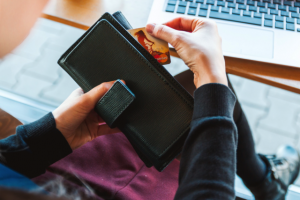You are responsible for your own Online Safety and Privacy, so here are some tips to help you stay safe and private on campus.
1. Keep security systems up to date
All connected devices must have up-to-date anti-virus, operating software and applications. Turn on automatic updates! It’s important to have the latest protection against viruses, malwares, and other threats you’re exposed to.

2. Check your banks statements often
This should become a habit. Aim to check your statements once a day to make sure all transactions are legitimate.
3. Buy only on secure sites
Shopping online is great, but you need to make sure you’re doing it from a secure network. Avoid confidential transactions such as shopping and banking when using a public campus network; instead, consider using a virtual private network (VPN) or smartphone hotspot for more secure browsing. Also pay attention to the sites. Make sure the URL starts with https:// and look for reviews to make sure it’s safe.
4. Backup everything
What if you’re working on an important research project and lose everything before the deadline? Store your work securely in the cloud or on an external hard drive.
5. Get information about ransomware
Hackers can remotely lock your computer and store your personal files in encrypted form until you pay them. Don’t pay the ransom! Get the information to know what to do in this situation. To protect your files from this, be careful when clicking on links or opening attachments in emails.
6. Improve your passwords
Do not use the same password for different services. Avoid passwords that are easy to guess, such as those that contain your name, birthday, or address. Make your password a sentence of at least 12 characters – focus on positive sentences that are easy to remember – many sites even allow spaces!
7. Never share passwords
So you have an important email waiting and thought your roommate could check it for you? Do not do it! That doesn’t mean you don’t trust them. Do not share your passwords!
8. Keep your passwords safe
How did you remember all those passwords? Don’t save them in a note on your phone. If someone gets to it, they will have access to everything. Write down your passwords in a journal, notebook, or piece of paper that you keep in a safe place away from your computer, or try using a password manager that will store them for you.
9. Learn what to do in the event of a data breach
Campus networks and servers are vulnerable to data breaches, meaning hackers can compromise computer accounts. There’s not much you can do to protect yourself against these practices, but if there’s a breach affecting your accounts, change all passwords immediately. Also check and monitor your bank statements.
10. Use public computers very carefully
Do you use a computer in the library? Never store your passwords on the websites you visit. Always log out before leaving the website. Delete any files you may have downloaded or saved from your device.
11. Don’t fall for phishing
If a suspicious site, email, or other message asks for sensitive information, such as your credit card number, social security number, or phone number, do not provide it.
12. Protect your devices
Protecting your devices includes protection against physical theft. Never leave devices unattended in public places. When you leave your devices in your room on campus, do not leave them in plain sight. You can use a cable lock for laptops and other devices to protect them.
13. Manage your privacy and the privacy of others
No one should post your photos on social media without your permission. Unflattering content or photos of you under the influence or engaging in risky behavior may pose disciplinary risks and/or affect your ability to obtain future employment. Ask friends to get your permission before writing about you, and do the same for them. The golden rule also applies online.
14. Think before you click
Before you open an email or click on any link you’re not sure about, stop and think. Make sure your antivirus is up to date. Think: Do you really need to click? If in doubt about a link or attachment, discard it.
15. Share carefully
Social media is all about sharing, but that doesn’t mean you have to put your whole life out there. Do not share your personal information. You don’t need to let the world know when you leave your dorm room and leave your belongings unattended.
Your university does a lot to protect you online, but you still have a lot of responsibility for your own security. Visit stagestaysafe.wpengine.com for more tips, resources and news about protecting your online safety, security and privacy.
